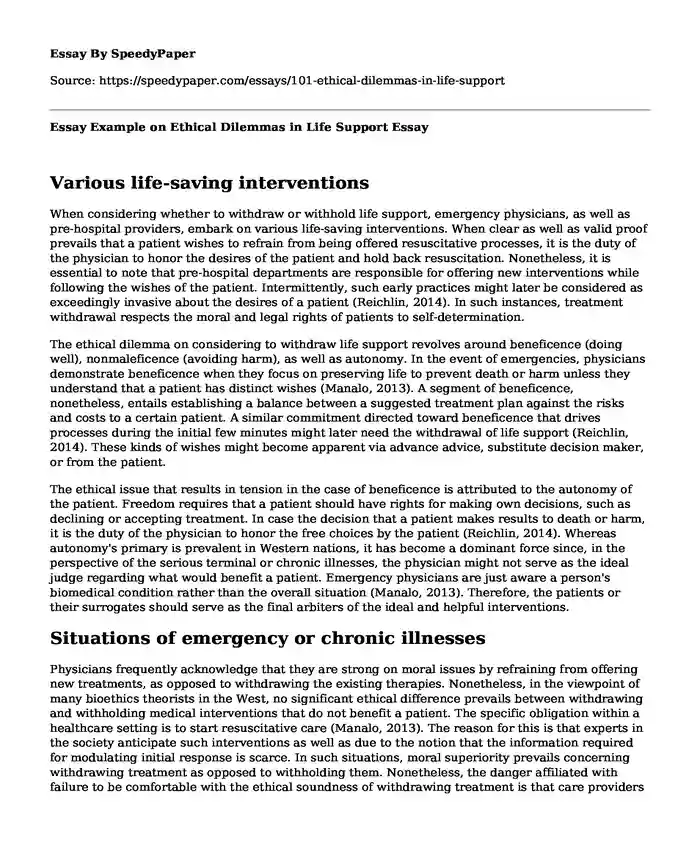
| Type of paper: | Essay |
| Categories: | Medicine Ethical dilemma |
| Pages: | 3 |
| Wordcount: | 632 words |
Various life-saving interventions
When considering whether to withdraw or withhold life support, emergency physicians, as well as pre-hospital providers, embark on various life-saving interventions. When clear as well as valid proof prevails that a patient wishes to refrain from being offered resuscitative processes, it is the duty of the physician to honor the desires of the patient and hold back resuscitation. Nonetheless, it is essential to note that pre-hospital departments are responsible for offering new interventions while following the wishes of the patient. Intermittently, such early practices might later be considered as exceedingly invasive about the desires of a patient (Reichlin, 2014). In such instances, treatment withdrawal respects the moral and legal rights of patients to self-determination.
The ethical dilemma on considering to withdraw life support revolves around beneficence (doing well), nonmaleficence (avoiding harm), as well as autonomy. In the event of emergencies, physicians demonstrate beneficence when they focus on preserving life to prevent death or harm unless they understand that a patient has distinct wishes (Manalo, 2013). A segment of beneficence, nonetheless, entails establishing a balance between a suggested treatment plan against the risks and costs to a certain patient. A similar commitment directed toward beneficence that drives processes during the initial few minutes might later need the withdrawal of life support (Reichlin, 2014). These kinds of wishes might become apparent via advance advice, substitute decision maker, or from the patient.
The ethical issue that results in tension in the case of beneficence is attributed to the autonomy of the patient. Freedom requires that a patient should have rights for making own decisions, such as declining or accepting treatment. In case the decision that a patient makes results to death or harm, it is the duty of the physician to honor the free choices by the patient (Reichlin, 2014). Whereas autonomy's primary is prevalent in Western nations, it has become a dominant force since, in the perspective of the serious terminal or chronic illnesses, the physician might not serve as the ideal judge regarding what would benefit a patient. Emergency physicians are just aware a person's biomedical condition rather than the overall situation (Manalo, 2013). Therefore, the patients or their surrogates should serve as the final arbiters of the ideal and helpful interventions.
Situations of emergency or chronic illnesses
Physicians frequently acknowledge that they are strong on moral issues by refraining from offering new treatments, as opposed to withdrawing the existing therapies. Nonetheless, in the viewpoint of many bioethics theorists in the West, no significant ethical difference prevails between withdrawing and withholding medical interventions that do not benefit a patient. The specific obligation within a healthcare setting is to start resuscitative care (Manalo, 2013). The reason for this is that experts in the society anticipate such interventions as well as due to the notion that the information required for modulating initial response is scarce. In such situations, moral superiority prevails concerning withdrawing treatment as opposed to withholding them. Nonetheless, the danger affiliated with failure to be comfortable with the ethical soundness of withdrawing treatment is that care providers might be hesitant to start lifesaving treatments, which a patient might need during the initial stages of emergency care (Reichlin, 2014).
In conclusion, vital interventions when providing care in situations of emergency or chronic illnesses might be withdrawn appropriately when sufficient information exists. In this case, physicians should ensure they recognize the ethical soundness of withdrawing interventions while at the same time making sure they are familiar with the processes they need to respect the end-of-life desires of the patient.
References
Manalo, M. F. (2013). End-of-life decisions about withholding or withdrawing therapy: Medical, ethical, and religio-cultural considerations. Palliative Care, 7 (1), 1-5.
Reichlin, M. (2014). On the ethics of withholding and withdrawing medical treatment. Retrieved from https://mrmjournal.biomedcentral.com/articles/10.1186/2049-6958-9-39
Cite this page
Essay Example on Ethical Dilemmas in Life Support. (2019, Mar 14). Retrieved from https://speedypaper.net/essays/101-ethical-dilemmas-in-life-support
Request Removal
If you are the original author of this essay and no longer wish to have it published on the SpeedyPaper website, please click below to request its removal:
- Learn Elizabeth Gaskell's Literary Devices in the Essay Sample
- Research Paper Sample: Experiences of Managing the Study, Work, and Life in Undergraduate Students
- Check the Case Study of a Patient with Back Pain in This Free Essay
- Importance of College Education, Essay Example for Everyone
- Work Breakdown Structure in eBook Printing, Free Essay in Project Management
- The Divine Inheritance - Creative Writing Essay Example
- Essay Example: Types of Social Media
Popular categories




